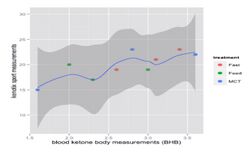Blood vs. Breath
| Project Infobox | |
|---|---|
| Self researcher(s) | Robert Ness |
| Related tools | Ketonix Sport |
| Related topics | Metabolism, Breathing rhythm, Blood tests and blood pressure, Food tracking |
Builds on project(s) |
|
| Has inspired | Projects (0) |
| Show and Tell Talk Infobox | |
|---|---|
| Featured image | 
|
| Date | 2015/06/21 |
| Event name | 2015 QS Global Conference |
| Slides | Blood-vs-breath.pdf |
| This content was automatically imported. See here how to improve it if any information is missing or out outdated. |
Blood vs. Breath is a Show & Tell talk by Robert Ness that has been imported from the Quantified Self Show & Tell library.The talk was given on 2015/06/21 and is about Metabolism, Breathing rhythm, Blood tests and blood pressure, and Food tracking.
Description[edit | edit source]
A description of this project as introduced by Quantified Self follows:
Robert Ness wanted to test how the Ketonix Sport device for tracking ketone bodies by breath compared to the painful and expensive method of measuring ketones in the blood. Ness gathered a wide range of data while doing a seven day full fast, then a seven day fat-only fast, followed by a normal ketogenic diet.
Video and transcript[edit | edit source]
A transcript of this talk is below:
Robert Ness “Blood vs. Breath”
So breath versus blood, real starvation versus simulated starvation. So the short of it is I tracked ketone bodies with two devices to see how one compares to the other. And so first I’ll talk a little bit about why I wanted to track ketosis. So I build physical models of metabolomics data, so in the Quantified Self space, I'm really interested in tracking biochemical data. Ketone body measurements are biochemical data and to me, this is one of the most compelling parts of the QS movement. So a little bit of background, ketosis is when you’re burning fat instead of carbs for energy. It can be induced by diet and people do this to lose weight, to optimize athletic performance. So a friend of mine, he’s in the audience somewhere, I’m building a knowledge base for his website, Smart Drugs Smart on cognitive intervention. And we came across some research that indicated that tracking ketones could be possibly used to optimize cognition, so this got me a bit more interested. And so the question I wanted to answer first was could breath measurements replace blood measurements so the gold standard for quantifying ketones is a DIY kit that does a blood prick and measure BHP in the blood. There’s a device called a Ketonix Sport, which measures a ketone body called acetone in the breath. So obviously blood ketone is much more reliable, it’s been around for a while. It also hurts, it’s expensive. The Ketonix Sport is easy. You buy it one-time upfront cost, but is it reliable? And so I wanted to do a kind of sanity test, and you know I really want us to do more of this in this community kind of benchmarking our newfangled devices against stuff we know that works. So I tried three different diets, and varied them to get a kind of more variation of my kind of energy economy, took measurements on the last three days of the diets at twelve, one, and four PM. The three diets were a full-fast, a fat-fast, and the normal ketogenic diet. The full fast which was real starving fasted for seven days on just water and tea, measurements in the last three days. The fat-fast was fat only, a little bit of fiber as well, also seven days right after the first diet and then keto diet on the last day. People were asking me why didn’t I also do a carb diet to get the full range because I don’t care about carbs because I’m usually on a ketogenic diet. So I really want this thing to be precise and in the range of ketosis because otherwise, it's not useful to me. So some results, and I noticed today that I colored these by hour instead of fast, but it doesn’t matter because there was no clustering across data points of diets which was weird. Did see some trends that were common across both devices over hours. And of course I saw a mild trend between the two devices but there was so much variation. So, in conclusion, there was a lot of variation that I couldn't make solid conclusions that okay, that Ketonix could replace the blood ketone measurements. But, I had a little bit of a trend so I don’t feel completely regretful about buying the thing. I also saw a bit more variation in the fat-fast which could be an artifact but.
A quick comment, if you’re on the diet you’re in ketosis so why even track. And if we can quantify ketone bodies and along with another analysis there is a possibility that we might be able to develop a biomarker that could be used to optimize some level of performance, say for example physical performance or even cognitive performance, so thank you.
About the presenter[edit | edit source]
Robert Ness gave this talk.